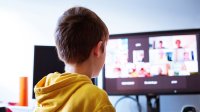Has the Pandemic Ushered in New Norms in Education?
Less reliance on high-stakes testing and more emphasis on student choice could be here to stay.
Your content has been saved!
Go to My Saved Content.Remember when you had growth spurts as a teenager and your joints hurt because you grew, like, four inches overnight? For schools, 2020 has been a bit like that. It hurts to grow sometimes, but it’s necessary. And, whether we’re ready or not, education is evolving.
Reflecting helps us process our growth. So as we wrap up this difficult year and look toward the next one, I thought I’d reflect on what may prove sticky and what I hope will retain a permanent place in education.
Now, I’m not talking about technological growth. Heaven knows, we’ve all done a lot of that! From Zoom to Google Classroom, Flipgrid to Nearpod, we’ve all been building our edtech tool kit throughout this time.
Pedagogical growth is the kind of growth we need to recharge and reimagine education. I’m also talking about something I’m calling “educational character” growth. It’s the flipping of priorities in order to address achievement, or the reprioritizing of community and compassion over content as a means to positively impact curriculum and student achievement.
My district, San Gabriel Unified, is a small Title I district in Los Angeles committed to carving out reflection at this time. We’re reflecting on what’s happening to our students, our families, our staff, and our community. We’ve purposefully taken time to talk to all of our stakeholders: students, parents, teachers, local business owners, outside experts, and educators from other schools and districts in Los Angeles and beyond. And we’re asking ourselves, what do we want to see stick? These same conversations are happening in schools, districts, and states all over the country.
It’s clear that education’s needle is being pushed. After all, while Covid-19 is (hopefully) temporary, some things we’ve learned during this time might not be. So, I’ve created a list of things that many are predicting will prove sticky long after we’ve emerged from this pandemic. I’ve also created a list of what many hope will prove more permanent as well.
What Is Predicted to Stick
1. Assessments are a-changing. Assessments don’t need to be high-stakes, nationwide, standardized tests. There are many ways to diagnose learning levels, check for understanding, and hold students accountable. And people are talking about how to better align assessments with 21st-century learning instruction rather than align instruction with 20th-century testing practices. I was even in a webinar with college admission directors from a number of schools who were talking about the movement to look at portfolios and project-based learning culminating artifacts over ACTs and SATs. It’s not the reality yet, but the discussions are happening.
2. Connecting with students comes first. Understanding and being empathetic of our students’ circumstances has helped us individualize for their needs, understand their assets, and support them during this time. Social and emotional learning and awareness will become embedded into lesson planning as well as classroom culture in a more intentional and frequent way. Much as we check for understanding, we’ll also be checking for wellness.
3. Communicating with the community is vital in this partnership of learning. We will continue to involve families and parents in the learning process. We have learned to communicate in a variety of ways with flexibility at the heart of how we approach families. They are the key to engagement and learning.
4. Engagement strategies must be used if students are even going to tune in to learning. Engagement strategies like connecting with students, allowing for choice, using project-based learning to make lessons and units more meaningful, and incorporating visuals and recordings to make text more multimodal are key in bringing students to the learning table. As author/educator Kelly Gallagher says, “Engagement first, then content, then rigor.”
The world outside of education also has learned a lot during this time, and those lessons might also be predictors about elements that could be here to stay. They’ve learned that there’s a lot more to school than just content delivery (duh). And all classes provide deep and necessary experiences that far exceed mere academic access. Schools also provide a consistent food source, exercise, and social interaction.
We’ve learned that we can’t sell our kids short. Kids of all ages can learn how to navigate this virtual world. It’s amazing.
What I Hope Is Here to Stay
In the position paper “Education Reimagined,” put out by the New Pedagogies for Deep Learning, authors Michael Fullan and Joanne Quinn state, “Even before the pandemic there was readiness building for a new system of learning.” They list the trends toward using school to help students make an impact on the world around them as well as building on the interests of students to leverage learning. During this time, we’ve seen movement on other topics as well:
- Prioritizing skills and standards
- Using mastery portfolios to assess learning
- Using inquiry and project-based learning to assess process over product
- Examining the importance of feedback over grades
- Deepening respect for the dedication and resilience of teachers
During hardships, we often want nothing more than to wrap ourselves in a blanket of what’s familiar. But crisis creates opportunity, and if we don’t move beyond this chapter without having evolved in our practice, it will have been an opportunity wasted. This opportunity is about growth. It’s about reflection on what needs to stay and what needs to go.
Wouldn’t it be great if compassion and community were the foundations upon which academic learning was built? I think we’re on our way.
